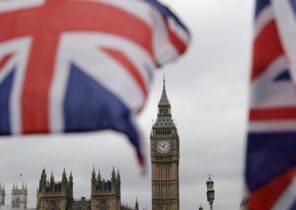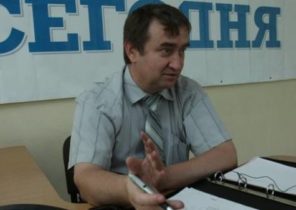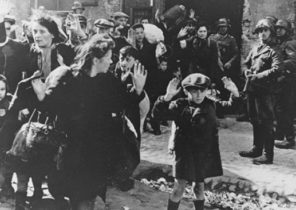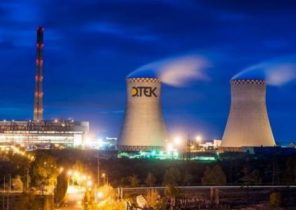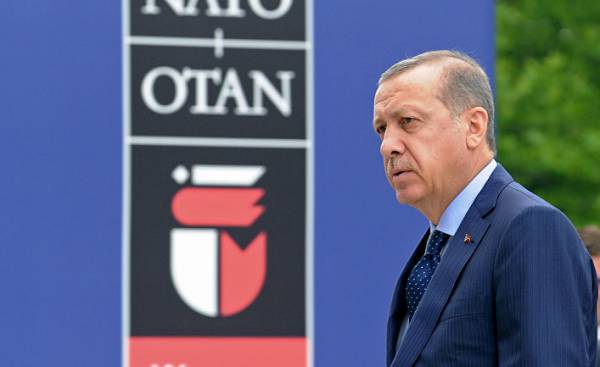
While Erdogan threatens its NATO allies that it would revise terms of military cooperation, in Brussels, are actively discussing a Turkish threat to the Alliance. Relationship of the parties, which in February this year celebrated the 65th anniversary of their Alliance, going through the deepest crisis in history.
The Turkish side are increasingly voices that Turkey should leave the Alliance. The Deputy of the ruling justice and development Shamil Tier and even called NATO a “terrorist organisation involved in operations against Turkey.” NATO officials are more restrained, but both sides have accumulated a lot of claims to each other, to mutual dissatisfaction grows as increases, and the range of issues on which Ankara and Brussels have almost no chance to negotiate.
Claims Of Ankara
In late June, Turkish President Recep Tayyip Erdogan once again accused NATO allies that they are “collaborating with terrorists”, and this is incompatible with the partnership with Turkey. “In that case I will have to reconsider the very essence of NATO activities. These actions are a gross violation of the norms and principles of the Alliance,” — said the Turkish leader.
Speaking about terrorists, Erdogan was referring to the units of the Syrian Kurds fighting in Syria against the group “Islamic state” (banned in Russia), which the Pentagon began to supply weapons in may 2016. Ankara considers the units of the Syrian Kurds as an offshoot of the Kurdistan workers party (PKK), with which she more than 30 years waging war on the South-East of Turkey. Do the PKK as terrorist not only by Turkey but by NATO.
The Alliance hold a different point of view on the Syrian Kurds (perhaps turning a blind eye to Turkey provide evidence on the relationship of the units of the Syrian Kurds with the PKK). NATO leaders believe that the Syrian Kurds — an effective military force against “Islamic state” and the cooperation with them is essential to the success of the operations in Syria and Iraq. Turkey, in turn, makes no distinction between units of the Syrian Kurds and radicals from the “Islamic state”, arguing that they both “terrorists”. Erdogan has repeatedly warned the allies that, if necessary, Ankara may launch a new military operation in Northern Syria against the Kurds.
Disagreements over the Kurds is not the only thing that complicates the relationship between the parties. After a failed attempt of a military coup in July 2016, the Turkish leadership is increasingly turns its foreign policy in the continuation of the internal. All the main internal problem of Turkey: the conflict with the Kurds, fighting with the organizers of the coup, a referendum on amendments to the Constitution, and so forth, or otherwise affect the relations of Turkey with international partners, including NATO.
For example, Ankara blocks part of Austria in some programs, NATO only because Vienna has banned campaign rallies among the Turkish Diaspora in Austria on the eve of the April referendum in Turkey.
Even Germany was forced to leave a Turkish military air base Incirlik and for some time to suspend its participation in anti-terrorist operations in Syria and Iraq due to the fact that the Turkish authorities did not like the decision of Berlin to grant political asylum to the military, which Ankara accuses of involvement in last year’s coup.
According to the Constitution of Germany the German army is subordinate to the Bundestag, therefore, the deputies are obliged to attend German soldiers abroad. They are more than a month trying to get the permission of Ankara to visit their military personnel stationed on the base of Incirlik, but their efforts were not successful — Ankara permission is not given. To resolve the crisis did not help even a special visit of Minister of foreign Affairs of Germany Sigmar Gabriel in Turkey.
As a result, in early June, the German government made the final decision to leave the Turkish base and relocate its military equipment to Jordan. In Germany this development considering it as a betrayal of a NATO ally. In Turkey, the refusal to explain the “internal reasons”.
Given that Germany is home to the largest Turkish Diaspora in the world, “internal reasons” can continue to be the reason for different kinds of conflicts in the relations of Germany and Turkey. Fleeing persecution at home, many supporters of the Hizmet movement of the preacher Fethullah Gulen, whom Ankara accuses of organizing the military coup and the Kurdish activists fled to Germany. According to estimates of the Turkish side, more than four hundred people have applied for political asylum to German authorities, including many military and diplomats. Turkey demands their immediate extradition.
NATO waits
In turn, NATO Turkey has also accumulated a lot of claims, but unlike the Turkish side, the Alliance prefers to take a wait and in no hurry to make any accusations Ankara. One of the main sources of concern for NATO, the current state of the Turkish army, the second largest in the Alliance.
After the failed coup, the Turkish authorities began mass arrests and the dismissal of persons who in their opinion, involved in the coup. Most went to the military. Arrests greatly reduced the ranks of the Turkish army. According to the armed forces of Turkey, who is quoted by the newspaper Hurriyet Daily News, two weeks before the coup, the Turkish army numbered over 518 thousand people, now — 355 212. Decreased by one third, and composition of the generals. Turkey faced a serious shortage of military pilots.
NATO allies are anxiously watching the ongoing changes in the Turkish army. Previously, the highest part of the Turkish armed forces had already been subjected to cleansing. Islamist Erdogan’s government, together with its former ally theologian Fethullah gülen and his followers at the time, faked litigation “Balyoz” and “Ergenekon”, against the military elite. Hundreds of generals and officers of the Turkish army were arrested. It was mainly a secular Pro-Western military-Kemalists who were a threat to the Islamist Union party of justice and development and the gülen movement.
However, in contrast to “Balasa” and “Ergenekon” current purges in the army on an unprecedented scale. The authorities of the NATO countries and see for yourself that hundreds of Turkish military forces in foreign missions in the countries of the Alliance, turned to them for political asylum. They refuse to return to Turkey, explaining that there is for them is unsafe and they can be at any time arrested.
Also NATO warily watches the rapprochement of Turkey with Russia and participation of Ankara in Moscow initiated a trilateral format on the settlement in Syria. Can not fail to excite the Alliance and the opportunity of Ankara with Moscow on the purchase of Russian anti-aircraft missile systems s-400.
The General opinion among Western experts about the deal’s off. Many believe that the talks about the purchase of Russian s-400 needs Turkey in order to force the NATO allies nervous, and once again demonstrate their independence. It is possible that Turks talks with Moscow is needed for pragmatic reasons: they just want to bring down the price of the NATO system. However, what comes next conflict, NATO and Turkey, the less impossible it looks such a bargain.
A provocateur, but our
Turkey is bolder NATO provokes his flirtation with Moscow and the conflict with the individual countries of the Alliance. Thus, Ankara wants to show the allies their significance and independence. Erdogan’s Turkey is closely to the status of a loyal NATO ally, albeit with the second army in the Alliance. She wants to be a leading regional power, make her own decisions, not looking at anyone.
It is, in fact, in recent years and makes — in the middle East, relations with Russia, Israel and EU countries. Another clear manifestation of the independence of Turkey was the support that Ankara is supporting the Qatar, insulated other Arab allies of the United States. Turkey said that not only will not leave “their Qatari brothers”, but also creates a military base there.
NATO partly understand the logic of a new Turkey. Erdogan is a provocateur, but he’s still NATO provocateur, so some of his antics (as in the case of base Injirlik) Alliance simply closes his eyes. Turkey has an important strategic position in the troubled region of the Middle East, has access to the Black sea and the Mediterranean. “Establishing strong relations with Turkey is one of NATO’s priorities”, — said recently in an interview with Politico, General Petr Pavel, Chairman of the NATO Military Committee. Former Secretary General of the Alliance Anders Fogh Rasmussen in a recent interview with the Financial Times stated that if NATO were to sever ties with Turkey, it preoriented to the East and it will not be in the strategic interests of the Alliance.
Withdrawal from NATO is not in the strategic interests of Turkey — Ankara is simply no alternative to participation in the Alliance, and the economy is firmly tied to the West. Ankara has no intention of leaving the Alliance, as it did not want fans of the theories of the Eurasian brotherhood, popular in Russia and Turkey. Turkey still values its NATO membership, and NATO cares about Turkey. But on specific issues the parties will be harder to negotiate, and at times impossible.
